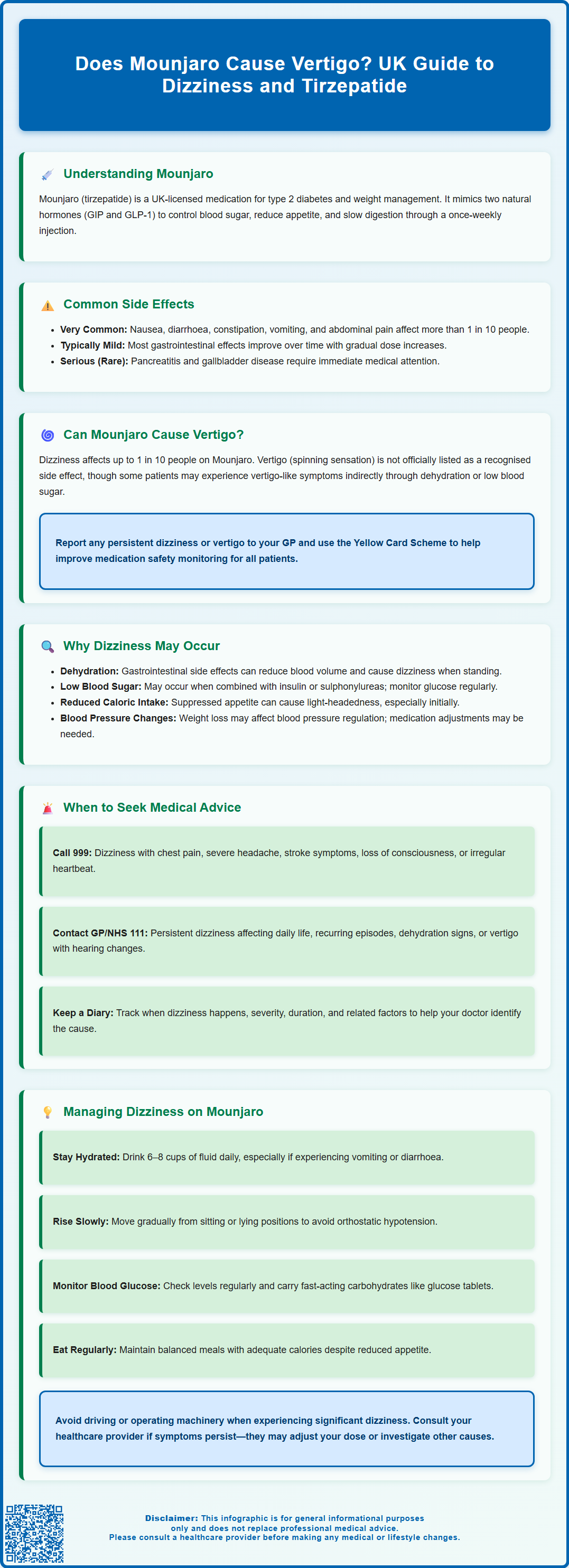Mounjaro (tirzepatide) is a dual GIP and GLP-1 receptor agonist licensed in the UK for type 2 diabetes and weight management. Whilst dizziness is a recognised side effect affecting up to 1 in 10 patients, vertigo—the sensation of spinning—is not specifically listed in UK regulatory documentation. Understanding the distinction between these symptoms and their potential causes is essential for safe medication use. This article examines whether Mounjaro causes vertigo, explores why dizziness may occur, and provides guidance on when to seek medical advice and how to manage these symptoms effectively.
Summary: Dizziness is a common side effect of Mounjaro (affecting up to 1 in 10 people), but vertigo is not specifically listed in UK regulatory documentation.
- Mounjaro (tirzepatide) is a dual GIP and GLP-1 receptor agonist licensed for type 2 diabetes and weight management in the UK
- Dizziness may result from dehydration due to gastrointestinal side effects, hypoglycaemia when combined with other diabetes medications, or reduced caloric intake
- Seek urgent medical attention if dizziness occurs with chest pain, severe headache, stroke symptoms, loss of consciousness, or severe abdominal pain
- Management includes maintaining adequate hydration, rising slowly from sitting or lying positions, monitoring blood glucose levels, and ensuring balanced nutrition
- Report persistent or concerning symptoms to your GP or via the MHRA Yellow Card Scheme for ongoing medication safety monitoring
Table of Contents
Understanding Mounjaro and Its Common Side Effects
Mounjaro (tirzepatide) is a prescription medicine licensed in the UK for the treatment of type 2 diabetes mellitus. It is also licensed for weight management in adults with obesity or overweight with weight-related comorbidities, though NHS access may vary according to NICE guidance. Mounjaro belongs to a novel class of medications known as dual glucose-dependent insulinotropic polypeptide (GIP) and glucagon-like peptide-1 (GLP-1) receptor agonists. By mimicking the action of these naturally occurring incretin hormones, Mounjaro helps regulate blood glucose levels, reduces appetite, and slows gastric emptying.
The mechanism of action involves binding to both GIP and GLP-1 receptors, which stimulates insulin secretion in a glucose-dependent manner, suppresses glucagon release, and promotes satiety. This dual action distinguishes tirzepatide from single GLP-1 receptor agonists and contributes to its efficacy in glycaemic control and weight reduction. Mounjaro is administered once weekly via subcutaneous injection, typically in the abdomen, thigh, or upper arm.
Common side effects associated with Mounjaro predominantly affect the gastrointestinal system. According to the Summary of Product Characteristics (SmPC), these include:
-
Nausea (very common: may affect more than 1 in 10 people)
-
Diarrhoea and constipation (very common)
-
Vomiting and abdominal pain (very common)
-
Decreased appetite and dyspepsia (very common)
Most gastrointestinal adverse effects are mild to moderate in severity and tend to diminish over time as the body adjusts to treatment. Dose escalation is typically gradual to minimise these effects. Other reported side effects include injection site reactions and hypoglycaemia (particularly when used with insulin or sulphonylureas).
Less common but important potential adverse effects include pancreatitis and gallbladder disease. Understanding the full spectrum of potential adverse effects is essential for both patients and healthcare professionals to ensure safe and effective use of this medication.

Can Mounjaro Cause Vertigo or Dizziness?
Dizziness is listed as a common side effect in the Mounjaro Summary of Product Characteristics (SmPC), meaning it may affect up to 1 in 10 people. According to the documentation approved by the Medicines and Healthcare products Regulatory Agency (MHRA), dizziness occurs in a proportion of patients during clinical trials. However, vertigo—the sensation of spinning or rotational movement—is not specifically listed as a recognised adverse effect of tirzepatide in the UK SmPC, though spontaneous reports may still occur.
It is important to distinguish between dizziness and vertigo, as these terms are often used interchangeably but describe different experiences. Dizziness is a broad term encompassing light-headedness, unsteadiness, or a feeling of faintness, whereas vertigo specifically refers to an illusion of movement, typically rotational.
That said, some patients may experience sensations they describe as vertigo whilst taking Mounjaro, which could be related to secondary effects of the medication rather than a direct pharmacological action. For instance, significant gastrointestinal side effects leading to dehydration, or episodes of hypoglycaemia in susceptible individuals, might produce dizziness or light-headedness that patients interpret as vertigo.
Post-marketing surveillance and patient reports continue to inform our understanding of medication side effects. If you experience vertigo or persistent dizziness whilst taking Mounjaro, it is essential to report this to your GP or healthcare provider. They can assess whether the symptom is related to the medication, an underlying condition, or another cause entirely. The Yellow Card Scheme (https://yellowcard.mhra.gov.uk), operated by the MHRA, allows patients and healthcare professionals to report suspected side effects, contributing to ongoing medication safety monitoring.
Why Dizziness May Occur with Mounjaro Treatment
Several mechanisms may explain why some patients experience dizziness whilst taking Mounjaro, even though it is not a primary pharmacological effect of the drug. Understanding these potential causes can help patients and clinicians identify and address the underlying issue.
Dehydration and fluid loss represent one of the most common explanations. The gastrointestinal side effects of Mounjaro—particularly nausea, vomiting, and diarrhoea—can lead to significant fluid and electrolyte depletion. Dehydration reduces blood volume and can cause orthostatic hypotension (a drop in blood pressure upon standing), manifesting as dizziness or light-headedness. Patients experiencing persistent gastrointestinal symptoms should ensure adequate fluid intake and seek medical advice if symptoms are severe.
Hypoglycaemia (low blood glucose) is another potential cause, particularly in patients taking Mounjaro alongside other glucose-lowering medications such as insulin or sulphonylureas. Whilst Mounjaro's glucose-dependent mechanism reduces the risk of hypoglycaemia when used alone, combination therapy increases this risk. Symptoms of hypoglycaemia include dizziness, shakiness, confusion, sweating, and palpitations. Regular blood glucose monitoring and appropriate dose adjustments of concomitant medications are essential preventive measures.
Reduced caloric intake associated with Mounjaro's appetite-suppressing effects may also contribute to feelings of light-headedness, especially during the initial weeks of treatment. Patients should aim to maintain balanced nutrition despite reduced appetite, focusing on nutrient-dense foods.
Cardiovascular effects warrant consideration. According to the SmPC, Mounjaro can cause a modest increase in heart rate in some individuals. Additionally, weight loss may potentially affect blood pressure regulation in some patients. Those taking antihypertensive medications or diuretics may need dose adjustments if orthostatic symptoms develop. Patients with pre-existing cardiovascular conditions should be monitored appropriately.
Finally, anxiety or vasovagal responses related to self-injection may cause transient dizziness in some patients, particularly those new to injectable medications. This typically resolves with familiarity and proper injection technique.
When to Seek Medical Advice About Dizziness
Whilst mild, transient dizziness may not require immediate medical attention, certain symptoms and circumstances warrant prompt evaluation by a healthcare professional. Patients should be aware of red flag symptoms that indicate potentially serious underlying conditions.
Seek urgent medical attention (call 999 or attend A&E) if dizziness is accompanied by:
-
Chest pain or pressure
-
Severe headache, particularly if sudden onset
-
Difficulty speaking, facial drooping, or weakness on one side of the body (potential stroke symptoms)
-
Loss of consciousness or fainting
-
Severe shortness of breath
-
Rapid or irregular heartbeat with associated symptoms
-
Persistent severe abdominal pain radiating to the back with vomiting (signs of pancreatitis)
Contact your GP or NHS 111 if you experience:
-
Persistent or worsening dizziness that interferes with daily activities
-
Recurrent episodes of dizziness or light-headedness
-
Signs of dehydration: reduced urination, dark urine, extreme thirst, dry mouth, or confusion
-
Symptoms of hypoglycaemia that are frequent or severe
-
True vertigo with a spinning sensation, especially if accompanied by hearing changes or tinnitus
-
Dizziness following a fall or injury
For routine concerns, discuss dizziness at your next scheduled appointment, particularly if it is mild and infrequent. Your healthcare provider can review your medication regimen, assess for potential drug interactions, check blood pressure and blood glucose levels, and evaluate for other causes of dizziness unrelated to Mounjaro.
Keeping a symptom diary noting when dizziness occurs, its severity, duration, and any associated factors (such as timing relative to injection, meals, or position changes) can provide valuable information to help your clinician identify the cause and recommend appropriate management strategies.
Managing Dizziness While Taking Mounjaro
If you experience dizziness whilst taking Mounjaro, several practical strategies can help minimise symptoms and improve your comfort and safety during treatment.
Maintain adequate hydration: Drink plenty of fluids throughout the day, particularly if experiencing gastrointestinal side effects. Aim for 6–8 cups of fluid daily, and consider oral rehydration solutions if vomiting or diarrhoea is significant. Your urine should be pale straw-coloured. Avoid excessive caffeine and alcohol, which can contribute to dehydration.
Prevent orthostatic hypotension: Rise slowly from sitting or lying positions, allowing your cardiovascular system time to adjust. Sit on the edge of the bed for a moment before standing. If you feel dizzy upon standing, sit or lie down immediately to prevent falls. If symptoms persist, your doctor may check your sitting and standing blood pressure and review any blood pressure medications you're taking.
Monitor blood glucose levels: If you are taking other diabetes medications alongside Mounjaro, regular blood glucose monitoring is essential. Discuss with your healthcare team whether dose adjustments of other medications are needed. Always carry a fast-acting carbohydrate source (such as glucose tablets or fruit juice) to treat hypoglycaemia promptly.
Ensure adequate nutrition: Despite reduced appetite, maintain regular, balanced meals with sufficient calories and nutrients. Small, frequent meals may be better tolerated than large portions. Focus on easily digestible, nutrient-dense foods.
Review your medication regimen: Inform your GP or diabetes specialist about all medications you are taking, including over-the-counter products and supplements. Some medications can interact or compound dizziness. Your healthcare provider may need to adjust doses or timing of administration.
Avoid activities requiring alertness: If experiencing significant dizziness, avoid driving, operating machinery, or engaging in activities where loss of balance could cause injury until symptoms resolve. Follow DVLA guidance on diabetes and driving, particularly if you're at risk of hypoglycaemia.
Consistent injection schedule: According to the SmPC, Mounjaro should be administered on the same day each week, but can be given at any time of day, with or without meals. Maintaining consistency may help your body adjust to the medication.
If dizziness persists despite these measures, your healthcare provider may recommend temporarily reducing the Mounjaro dose, slowing the dose escalation schedule, or investigating alternative causes. Never discontinue or adjust your medication without medical guidance. With appropriate management and monitoring, most patients can continue Mounjaro treatment safely and effectively whilst minimising bothersome side effects.
Frequently Asked Questions
Is vertigo a recognised side effect of Mounjaro?
Vertigo is not specifically listed as a recognised adverse effect in the UK Summary of Product Characteristics for Mounjaro, though dizziness is a common side effect affecting up to 1 in 10 people. Any suspected vertigo should be reported to your GP or via the MHRA Yellow Card Scheme.
What causes dizziness when taking Mounjaro?
Dizziness whilst taking Mounjaro may result from dehydration due to gastrointestinal side effects, hypoglycaemia (particularly when combined with insulin or sulphonylureas), reduced caloric intake, or orthostatic hypotension. Your healthcare provider can assess the underlying cause and recommend appropriate management.
When should I seek medical help for dizziness on Mounjaro?
Seek urgent medical attention if dizziness occurs with chest pain, severe headache, stroke symptoms, loss of consciousness, or severe abdominal pain. Contact your GP or NHS 111 for persistent or worsening dizziness, signs of dehydration, frequent hypoglycaemia, or true vertigo with spinning sensations.
The health-related content published on this site is based on credible scientific sources and is periodically reviewed to ensure accuracy and relevance. Although we aim to reflect the most current medical knowledge, the material is meant for general education and awareness only.
The information on this site is not a substitute for professional medical advice. For any health concerns, please speak with a qualified medical professional. By using this information, you acknowledge responsibility for any decisions made and understand we are not liable for any consequences that may result.
Heading 1
Heading 2
Heading 3
Heading 4
Heading 5
Heading 6
Lorem ipsum dolor sit amet, consectetur adipiscing elit, sed do eiusmod tempor incididunt ut labore et dolore magna aliqua. Ut enim ad minim veniam, quis nostrud exercitation ullamco laboris nisi ut aliquip ex ea commodo consequat. Duis aute irure dolor in reprehenderit in voluptate velit esse cillum dolore eu fugiat nulla pariatur.
Block quote
Ordered list
- Item 1
- Item 2
- Item 3
Unordered list
- Item A
- Item B
- Item C
Bold text
Emphasis
Superscript
Subscript










